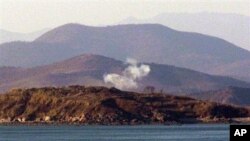Diplomatic efforts are underway in Asia to defuse tension on the Korean peninsula. But South Korea is effectively rejecting China's call to quickly convene multi-national talks to discuss North Korea. This comes as the United States and South Korea begin four days of naval drills seen as a show of strength to dissuade Pyongyang after last Tuesday's attack on Yeonpyeong island.
South Korea is effectively rejecting immediate resumption of multi-party dialog involving North Korea. The Foreign Ministry is saying, diplomatically, only that China's proposal deserves to be "very closely examined."
President Lee Myung-bak who met Sunday with visiting Chinese officials is quoted as telling them the timing is not right and it is more urgent to deal with North Korea's belligerence.
China says it wants to host emergency talks in December that would also include both Koreas, the United States, Japan and Russia.
South Korean presidential press secretary Hong Sang Pyong says President Lee told China's State Councilor, Dai Bingguo, Seoul expects Beijing to use its influence with Pyongyang to defuse the tension on the Korean peninsula.
The spokesman also says President Lee also conveyed that Seoul will forcefully respond to any further military provocations from the North.
The discussions occurred five days after North Korea hit a South Korean island with a barrage of artillery, killing four people.
The USS George Washington aircraft carrier, a pair of South Korean naval destroyers and other vessels are now in the Yellow Sea for four-days of war games.
U.S. officials say the maritime maneuvers were planned before last Tuesday's North Korean artillery attack. But they are not denying the drill is a show of force meant to deter Pyongyang from further provocations.
The director of South Korea's Research Institute of National Security Affairs, Choi Jong Chul, says it is unlikely North Korea will do anything provocative while the joint maneuvers are underway.
Choi (who is also a professor of military strategy at the Korea National Defense University) says, however, once the U.S. aircraft carrier departs, it cannot be predicted what North Korea will do, thus Seoul needs to be prepared for any eventuality.
South Korean media reports say North Korean forces have put surface-to-surface missiles on launch pads in the Yellow Sea and moved surface-to-air missiles to front-line areas.
Pyongyang is warning of retaliation amid the US-South Korean maneuvers. An official news agency dispatch Sunday spoke of North Korean forces delivering a "brutal military blow" if its territory is violated.
North Korea acknowledges hitting Yeonpyeong island while a South Korean annual military drill was underway there Tuesday. The exercise included the firing of artillery westward into the sea near the maritime boundary, which North Korea does not accept.
Pyongyang says if there were civilian deaths that is regrettable, but adds South Korea is using civilians as human shields on Yeonpyeong.
Those remaining on the island were ordered into bunkers for 40 minutes Sunday after fresh artillery firing was heard from North Korea, which is just 12 kilometers away. There is no indication any shells hit South Korean territory Sunday.
All journalists were ordered by the Defense Ministry to leave Yeonpyeong island by the end of the day. The ministry sent an emergency text message saying that remaining there would be dangerous because North Korea might take further provocative action.
President Lee Myung-bak on Monday morning is to make a national address. He has not spoken in public or to reporters since last Tuesday's attack.
South Korea Gives Cool Response to China's Call for Emergency Talks
- By Steve Herman





